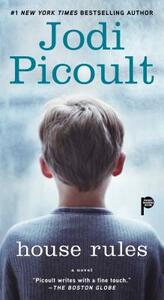Take a photo of a barcode or cover
Another unputdownable page turner from JP, who always delivers, and a fascinating insight into the world of Aspergers.
challenging
emotional
For the most, I did enjoy the book, as it consistently kept my interest. It is clear that Jodie did her research on Asperger’s, and as a speech therapist, it was definitely hard to read at some parts when he was being mistreated because others didn’t understand him. It’s also sad to think that these mistreatments happen in real life. The thing that frustrated me with this book, is that throughout the entirety of the story, it is thrown in your face that Jacob cannot/will not lie, and that you have to word questions differently than you would for most, and that they have to be very specific, literal questions. This kid is charged with murder, and his mom, who knows this more than anyone, never asks him specific questions about what happened that afternoon. It takes about 3/4 of the way into the book for her to even ask “did you kill her?” His mom should know that she might have to ask a question in multiple different ways in order to get the whole story. Also. Wasn’t thrilled about the whole “vaccines cause autism” part of the story. I feel like that’s spreading misinformation. Makes me wonder how many people are going to read this book, who won’t appropriately research, and walk away thinking vaccines cause autism. ALSO also - I love a good thought provoking ending where it’s up to the reader but COME ON lol.
Really interesting to listen to the story through the eyes of Jacob who has Aspergers. Maybe because I'm a teacher? Typical Jodi Picoult book, but I liked it.
dark
emotional
mysterious
medium-paced
Plot or Character Driven:
Plot
Strong character development:
No
Loveable characters:
Complicated
Diverse cast of characters:
Yes
Flaws of characters a main focus:
Complicated
Jodi Picoult did a lot of research for this book. I know this because Jodi Picoult tells us she did a lot of research for this book. No stone was left unturned and no factoid was left unsaid. One could argue that going into painstaking detail about every minute detail (e.g., paperwork filing) was needed to help the audience understand the book's autistic protagonist – to show how the autistic mind can fixate on these details. Except, Jodi Picoult delves into these inane details regardless of which perspective the chapter was written in.
Along these lines, while there can be a lot to be gained by using the multiple-perspective approach to narratives, it only works when we can clearly see a difference in voice or the presentation of thought. Everyone in House Rules - regardless of whether they were a 40-something-year-old single mother, a young 28-year-old lawyer, a detective, a 15-year-old boy, a 23-year-old social skills tutor or an 18-year-old boy with Asperger's – thought the same way. Sure, the content of their thoughts was different and their perspectives were different (in a stereotyped way: mom: mom thoughts, detective: detective thoughts, fifteen-year-old boy: angst and boobs, stereotypic caricature of young adult with Asperger’s: quirky thoughts). But they all shared the same voice and this was discombobulating. After being introduced to a hyper-literal characterisation of a person with Asperger’s (who we are told could not understand figurative language) it was startling to see that same person using figurative language and generally thinking in the exact same conversational “by gosh I'm just an average Joe” kind of thought pattern as his mother, lawyer, judge, detective, and 15-year-old brother.
In this book, Jodi Picoult went to great lengths to cross her Ts and dot her Is. This makes it even more egregious that she presented misinformation in her book. If one were to pick up House Rules, they would be forgiven for thinking that they were reading an information pamphlet about Asperger’s (and forensics and the justice system in Vermont) in narrative form. Because so much of this book oozes dry facts, one might not pick up on the misinformation. If the book weren’t presented like the encyclopedia of up-to-date autism (and forensics) research, then it wouldn’t be a problem to include this quackery to show the mother's desperation and willingness to believe in snake oil. But everything in this book appears to be so painstakingly researched (and is presented as such), why wouldn’t the average reader believe that mercury from vaccines causes autism? Why wouldn’t they believe that gluten and casein unequivocally reduce symptoms of Autism?
Along these lines, while there can be a lot to be gained by using the multiple-perspective approach to narratives, it only works when we can clearly see a difference in voice or the presentation of thought. Everyone in House Rules - regardless of whether they were a 40-something-year-old single mother, a young 28-year-old lawyer, a detective, a 15-year-old boy, a 23-year-old social skills tutor or an 18-year-old boy with Asperger's – thought the same way. Sure, the content of their thoughts was different and their perspectives were different (in a stereotyped way: mom: mom thoughts, detective: detective thoughts, fifteen-year-old boy: angst and boobs, stereotypic caricature of young adult with Asperger’s: quirky thoughts). But they all shared the same voice and this was discombobulating. After being introduced to a hyper-literal characterisation of a person with Asperger’s (who we are told could not understand figurative language) it was startling to see that same person using figurative language and generally thinking in the exact same conversational “by gosh I'm just an average Joe” kind of thought pattern as his mother, lawyer, judge, detective, and 15-year-old brother.
In this book, Jodi Picoult went to great lengths to cross her Ts and dot her Is. This makes it even more egregious that she presented misinformation in her book. If one were to pick up House Rules, they would be forgiven for thinking that they were reading an information pamphlet about Asperger’s (and forensics and the justice system in Vermont) in narrative form. Because so much of this book oozes dry facts, one might not pick up on the misinformation. If the book weren’t presented like the encyclopedia of up-to-date autism (and forensics) research, then it wouldn’t be a problem to include this quackery to show the mother's desperation and willingness to believe in snake oil. But everything in this book appears to be so painstakingly researched (and is presented as such), why wouldn’t the average reader believe that mercury from vaccines causes autism? Why wouldn’t they believe that gluten and casein unequivocally reduce symptoms of Autism?
emotional
hopeful
informative
slow-paced
House Rules by Jodi Picoult was such an engrossing read for me. I loved how she portrayed Jacob’s life and his struggles with Asperger’s syndrome—it felt real and empathetic without being overly sentimental. The family dynamics were especially compelling; I found myself deeply invested in Emma’s sacrifices as a mother and Theo’s struggles as the overshadowed sibling.
But the ending—oh, the ending! It left me wanting so much more. It felt like I was missing that final emotional payoff or resolution I’d been waiting for. I didn’t need a perfect bow on the story, but I wanted just a bit more clarity about where everyone ended up. Even so, it’s a book I couldn’t stop thinking about long after I turned the last page.
Somewhat too overloaded with the results of Picoult's research into Aspergers. The core mystery was intriguing but much of the book was predictable and about three times as long as it needed to be.
I would recommend this to anyone. House Rules was one of the best books I have ever read because it provided a realistic view into the life of a family living with autism. Although I read this book a while ago I feel as though it is a novel that I would enjoy at any age. It covers the struggles of having a child with autism and the hallmarks that come with autism. It also has a mystery/murder side to it that was very suspenseful. Like with any book I have read I felt connected with the characters because of the reality of the situations in the book. I loved this book and would read it again and again.



